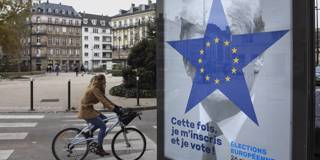The dearth of public trust and self-confidence in the European Union is contributing to policy paralysis, fueling public outrage, and undercutting the EU's ability to determine its own destiny. Both before and after next month’s European Parliament election, these deficits must urgently be addressed.
MADRID – In Spanish, the word confianza has a double meaning. On one hand, it describes a firm trust in something or someone – the kind of trust that people around the world, from Brazil to the United States to North Africa, increasingly lack in their leaders and even governance systems. On the other hand, confianza refers to confidence in oneself – something that is in particularly short supply in Europe.
In fact, the European Union is suffering from a deficit of confianza in both senses. This is a uniquely dangerous mix, because a lack of trust and self-confidence is leading the EU not just to outsider politics and even outlaw politicians, but also to policy paralysis, public outrage, and an utter inability to determine its own destiny. Both before and after next month’s European Parliament election – which will precede a new European Commission and a new European Council president – this deficit must urgently be addressed.
Public trust in EU leaders and institutions took a serious hit after the 2008 financial crisis. By then, the original purpose of the European project – to support peace on the continent after the devastation of World War II – had lost its purchase on public opinion. Europeans had gotten used to peace. Meanwhile, “Europe” became focused on the broader – and vaguer – goal of championing “shared values.” That objective underpinned the establishment of the formal EU institutions.

MADRID – In Spanish, the word confianza has a double meaning. On one hand, it describes a firm trust in something or someone – the kind of trust that people around the world, from Brazil to the United States to North Africa, increasingly lack in their leaders and even governance systems. On the other hand, confianza refers to confidence in oneself – something that is in particularly short supply in Europe.
In fact, the European Union is suffering from a deficit of confianza in both senses. This is a uniquely dangerous mix, because a lack of trust and self-confidence is leading the EU not just to outsider politics and even outlaw politicians, but also to policy paralysis, public outrage, and an utter inability to determine its own destiny. Both before and after next month’s European Parliament election – which will precede a new European Commission and a new European Council president – this deficit must urgently be addressed.
Public trust in EU leaders and institutions took a serious hit after the 2008 financial crisis. By then, the original purpose of the European project – to support peace on the continent after the devastation of World War II – had lost its purchase on public opinion. Europeans had gotten used to peace. Meanwhile, “Europe” became focused on the broader – and vaguer – goal of championing “shared values.” That objective underpinned the establishment of the formal EU institutions.